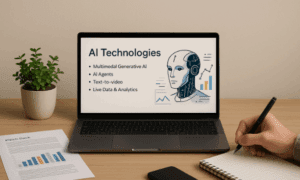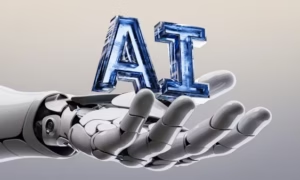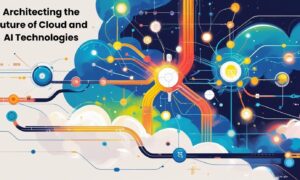Imagine a world where robots can think, learn, and solve complex problems alongside us. A future that surpasses the wildest imaginations of science fiction writers, where artificial intelligence (AI) seamlessly integrates into our everyday lives. From the pages of Isaac Asimov’s novels to present-day reality, AI has come a long way – revolutionizing industries and transforming human experiences in unimaginable ways. Join us on an exhilarating journey as we explore the evolution of AI from its sci-fi origins to real-world applications that are shaping our future society! Get ready to be astounded by how far this technology has progressed and discover why AI is no longer just a dream but an essential aspect of our modern lives.
Introduction to Artificial Intelligence
In its broadest definition, artificial intelligence (AI) is the ability of a digital computer or computer-controlled robot to perform tasks that are ordinarily done by human beings. However, AI is often associated with more narrowly defined goals, such as facial recognition, natural language processing (NLP), mechanical engineering design and game playing. Whatever the particular goal, all AI systems have certain common components:
Sensors: AI systems must be able to receive input from the external world. This might be in the form of images from a camera, text from a keyboard or environmental data such as temperature or sound levels.
Preprocessing: This is where raw data from sensors is converted into a form that can be more easily understood by the AI system. For example, an image might be converted into a set of pixels values; text might be converted into a set of words or numbers.
Processing unit: This is the “brain” of the AI system where information is processed and decisions are made. The type of processing unit will depend on the particular AI system; it might be a simple rule-based system, a neural network or something else entirely.
Actuators: These are components that enable the AI system to act on its environment. For example, a robot arm or an autonomous vehicle would need actuators to enable it to move around.
Historic Development of AI Technology
The field of artificial intelligence (AI) has been evolving rapidly since its inception in the 1950s. Early AI research was heavily influenced by science fiction, and many of the early AI applications were deployed in military and industrial settings. In the 1970s and 1980s, AI technology began to be used more widely in commercial applications such as expert systems, natural language processing, and machine learning. In the 1990s, AI witnessed a resurgence of interest due to advances in computational power and the advent of the Internet. Since then, AI has become an increasingly integral part of our lives, powering everything from search engines to self-driving cars.
Benefits of Artificial Intelligence Today
Today, AI is being used in a number of ways that are benefiting society. Here are just a few examples:
1. Health care: AI is being used to develop new treatments for diseases, create personalized medicine, and diagnose patients sooner.
2. Education: AI is being used to create adaptable learning programs, identify students who need extra help, and grade papers more accurately.
3. Business: AI is being used to automate tasks, improve customer service, and make better financial decisions.
4. Transportation: AI is being used to develop self-driving cars, plan efficient routes, and reduce traffic congestion.
5. environment: AI is being used to track wildlife, monitor air and water quality, and predict weather patterns.
Applications in Business, Education, and Healthcare
When it comes to artificial intelligence (AI), businesses, healthcare organizations, and educational institutions are all beginning to explore how this technology can be used to improve their operations. Here are some specific examples of AI applications in each of these fields:
Business: AI is being used by businesses to automate tasks, such as customer service inquiries and financial analysis. This frees up employees to focus on more strategic tasks. Additionally, AI-powered chatbots and virtual assistants are becoming increasingly common in the business world, assisting with tasks like scheduling meetings and providing information about products and services.
Education: AI is being used in education to personalize learning for students and help them progresses at their own individual pace. Additionally, AI-based tutoring systems are being developed that can provide real-time feedback and adjust content based on a student’s needs.
Healthcare: In healthcare, AI is being used for a variety of tasks, including diagnosing diseases, developing personalized treatment plans, and predicting patient outcomes. Additionally, AI is being used to create digital assistants for doctors and nurses that can help with things like documenting medical records and ordering supplies.
Growing Security Concerns Related To Artificial Intelligence
AI technology is becoming more sophisticated and widespread, raising new concerns about privacy and security. While AI can be used for helpful purposes, such as identifying trends and improving productivity, it can also be used to exploit personal data, manipulate behavior, and interfere with democratic processes. As AI gets smarter, these concerns are likely to become more prevalent.
One of the most worrisome aspects of AI is its potential to be used for mass surveillance. With the advent of facial recognition technology and other tools that can track our movements and activities, it is now possible for governments and other organizations to collect massive amounts of data on individuals without their knowledge or consent. This information can then be used to target ads, stifle dissent, or even influence our behavior in subtle ways.
Another concern is that AI may soon surpass human intelligence, leading to a future in which machines are capable of making decisions that have far-reaching consequences for us all. As AI becomes more powerful, there is a risk that it could be misused or abused by those with malicious intent. For example, imagine a future in which autonomous weapons are able to select targets without human input. These weapons could easily be hijacked by terrorists or other bad actors and used to cause mass destruction.
There is the worry that AI could lead to joblessness on a massive scale as robots increasingly replace humans in the workforce. While some jobs will always need to be done by humans (such as caring for the elderly or young children), many jobs that require manual labor or basic cognitive tasks will be taken over by robots, potentially leaving large numbers of people out of work.
Finally, there is the possibility that AI may be used in ways that are unethical or harmful. For example, algorithms designed to make decisions about hiring and promotions may inadvertently reproduce existing inequalities in society by giving preferential treatment to those who are already well-connected or privileged. Similarly, AI may be used to manipulate financial markets or create surveillance systems that target politically unpopular groups. There is also a risk that powerful AI systems might acquire goals that are inconsistent with human values and act against our interests.
In summary, the expanding use of AI technologies raises serious security concerns related to privacy, autonomy, job loss, and ethical risks. In order to ensure that these technologies are used responsibly and ethically, it is important for researchers and developers to consider these potential dangers as they design new AI systems. Governments must also take steps to create regulations around the usage of these technologies in order to protect citizens from abuse and exploitation.
How Artificial Intelligence Impacts Society
Artificial intelligence (AI) is a rapidly growing field with immense potential to impact society. Applications of AI are already being used in a variety of domains such as finance, healthcare, education, transportation, and more. As AI technology continues to evolve, so too will its applications and potential impact on society.
One area where AI is having a significant impact is in the realm of healthcare. AI-powered tools are being used to help doctors diagnose diseases and plan treatment strategies. In some cases, AI is even being used to directly provide care to patients. For example, chatbots powered by AI are being used to provide 24/7 mental health support to people in need.
AI is also starting to be used in the classroom. Schools are using AI-powered software to personalize learning for each student and provide real-time feedback. This allows teachers to focus on other tasks while still ensuring that each student receives an individualized education.
The potential applications of AI are vast and its impact on society is already evident. As the technology continues to develop, we can expect even greater changes and innovations in the years ahead.
Conclusion
Artificial intelligence has come a long way since its inception and is now being used in countless ways that improve quality of life. As AI technology continues to be developed, the possibilities are endless. We can only imagine what amazing applications will exist in our lifetime as AI evolves even further to become an integral part of our lives. It’s an exciting time for those interested in artificial intelligence and how it will shape our future world.



































